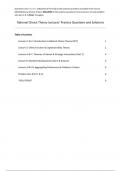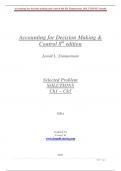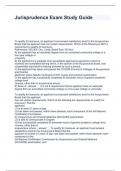(2023) Rational Choice Theory. INCLUDES all the practice questions from lectures 1-10 and problem
sets part 1 & 2 (Total: 35 pages).
Rational Choice Theory Lectures' Practice Questions and Solutions
Table of Contents
Lectures 1 & 2: Introduction to Rational Choice Theory (RCT) 1
Lecture 3: Utility Function & Expected Utility Theory 1
Lectures 6 & 7: Theories of Games & Strategic Interactions (Part 2) 4
Lecture 8: Market (Individualism) Failure & Solution 6
Lectures 9 & 10: Aggregating Preferences & Problems it Raises 6
Problem Sets (Part 1 & 2) 6
*SOLUTIONS* 9
, 1
Lectures 1 & 2: Introduction to Rational Choice Theory (RCT)
Question 1: An IRO student takes the below courses in their second year:
● Global Justice (GJ)
● International Development (ID)
● International security (IS)
● International Political Economy (IP)
● International Law & Human Rights (IH)
Assume that a student prefers GJ to IP, & is indifferent between GJ & IH. Also, they prefer IP to IH. Is this
student’s preferences rational?
Question 2: There are 3 main parties in the US: Republican, Democrat, & Independent. Willie is a libertarian,
& he shared below information about his political preferences over the main parties in the US:
1. 𝐼𝑛𝑑𝑒𝑝𝑒𝑛𝑑𝑒𝑛𝑡 ≽ 𝑅𝑒𝑝𝑢𝑏𝑙𝑖𝑐𝑎𝑛
2. 𝑅𝑒𝑝𝑢𝑏𝑙𝑖𝑐𝑎𝑛 ≽ 𝐷𝑒𝑚𝑜𝑐𝑟𝑎𝑡
In a happy hour, Willie tells his friends that as a rational voter, he is indifferent between independents &
democrats. Is this statement correct?
Question 3: Rational behaviour implies that…
a. A person makes a decision that sounds reasonable to the public.
b. A person can choose between their options.
c. Adding a new choice(option/alternative) to the set of choices can change the previous ranking of
these choices.
d. All of the above.
Question 4: Babak is a fan of football. He follows UEFA Champions League games. Among the remaining
teams in the tournament, he prefers Liverpool(LIV) to Real Madrid(RM); Porto(POR) to Chelsea(CHE); Porto
to Real Madrid; PSG to Liverpool. He also is indifferent between PSG and Bayern Munich (BM). Assume that
Babak’s preferences satisfy rational choice axioms, which of the below statements is True, False, or we do
NOT have enough information to evaluate:
1. Babak prefers PSG to RM.
2. Babak prefers Bayern to Porto.
3. Babak prefers Porto over Bayern.
Lecture 3: Utility Function & Expected Utility Theory
Question 5: Going to war? A country has $100 B wealth. As the leader of this country, you have 2 options to
acquire more wealth:
i. Alternative 1 (𝐿1): Focus on economic development projects, which leads to 3% growth after 1 year.
➔ Formalising: 𝐿1 = 1; 𝑈1 = $103𝐵
ii. Alternative 2 (𝐿2): Start a war with a country with rich natural resources.
● The outcomes:












